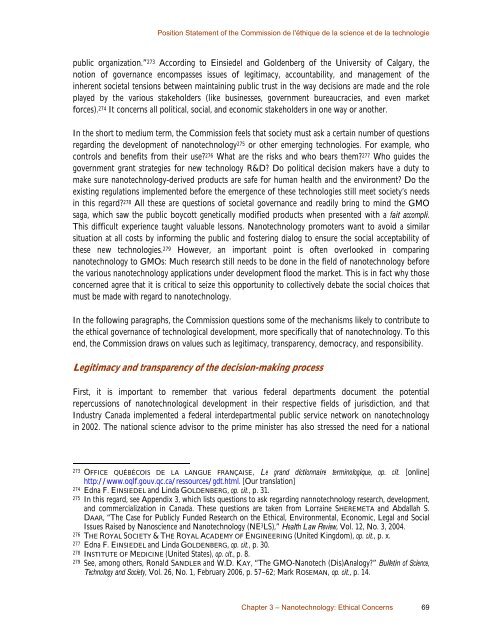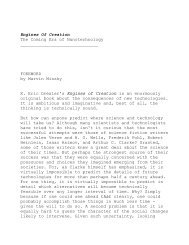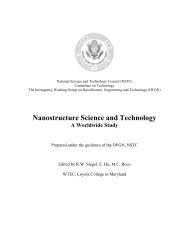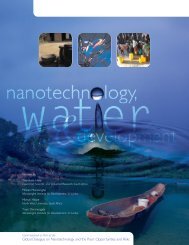A Basis for Action - Commission de l'éthique de la science et de la ...
A Basis for Action - Commission de l'éthique de la science et de la ...
A Basis for Action - Commission de l'éthique de la science et de la ...
You also want an ePaper? Increase the reach of your titles
YUMPU automatically turns print PDFs into web optimized ePapers that Google loves.
Position Statement of the <strong>Commission</strong> <strong>de</strong> l'éthique <strong>de</strong> <strong>la</strong> <strong>science</strong> <strong>et</strong> <strong>de</strong> <strong>la</strong> technologie<br />
public organization.” 273 According to Einsie<strong>de</strong>l and Gol<strong>de</strong>nberg of the University of Calgary, the<br />
notion of governance encompasses issues of legitimacy, accountability, and management of the<br />
inherent soci<strong>et</strong>al tensions b<strong>et</strong>ween maintaining public trust in the way <strong>de</strong>cisions are ma<strong>de</strong> and the role<br />
p<strong>la</strong>yed by the various stakehol<strong>de</strong>rs (like businesses, government bureaucracies, and even mark<strong>et</strong><br />
<strong>for</strong>ces). 274 It concerns all political, social, and economic stakehol<strong>de</strong>rs in one way or another.<br />
In the short to medium term, the <strong>Commission</strong> feels that soci<strong>et</strong>y must ask a certain number of questions<br />
regarding the <strong>de</strong>velopment of nanotechnology 275 or other emerging technologies. For example, who<br />
controls and benefits from their use? 276 What are the risks and who bears them? 277 Who gui<strong>de</strong>s the<br />
government grant strategies <strong>for</strong> new technology R&D? Do political <strong>de</strong>cision makers have a duty to<br />
make sure nanotechnology-<strong>de</strong>rived products are safe <strong>for</strong> human health and the environment? Do the<br />
existing regu<strong>la</strong>tions implemented be<strong>for</strong>e the emergence of these technologies still me<strong>et</strong> soci<strong>et</strong>y’s needs<br />
in this regard? 278 All these are questions of soci<strong>et</strong>al governance and readily bring to mind the GMO<br />
saga, which saw the public boycott gen<strong>et</strong>ically modified products when presented with a fait accompli.<br />
This difficult experience taught valuable lessons. Nanotechnology promoters want to avoid a simi<strong>la</strong>r<br />
situation at all costs by in<strong>for</strong>ming the public and fostering dialog to ensure the social acceptability of<br />
these new technologies. 279 However, an important point is often overlooked in comparing<br />
nanotechnology to GMOs: Much research still needs to be done in the field of nanotechnology be<strong>for</strong>e<br />
the various nanotechnology applications un<strong>de</strong>r <strong>de</strong>velopment flood the mark<strong>et</strong>. This is in fact why those<br />
concerned agree that it is critical to seize this opportunity to collectively <strong>de</strong>bate the social choices that<br />
must be ma<strong>de</strong> with regard to nanotechnology.<br />
In the following paragraphs, the <strong>Commission</strong> questions some of the mechanisms likely to contribute to<br />
the <strong>et</strong>hical governance of technological <strong>de</strong>velopment, more specifically that of nanotechnology. To this<br />
end, the <strong>Commission</strong> draws on values such as legitimacy, transparency, <strong>de</strong>mocracy, and responsibility.<br />
Legitimacy and transparency of the <strong>de</strong>cision-making process<br />
First, it is important to remember that various fe<strong>de</strong>ral <strong>de</strong>partments document the potential<br />
repercussions of nanotechnological <strong>de</strong>velopment in their respective fields of jurisdiction, and that<br />
Industry Canada implemented a fe<strong>de</strong>ral inter<strong>de</strong>partmental public service n<strong>et</strong>work on nanotechnology<br />
in 2002. The national <strong>science</strong> advisor to the prime minister has also stressed the need <strong>for</strong> a national<br />
273 OFFICE QUÉBÉCOIS DE LA LANGUE FRANÇAISE, Le grand dictionnaire terminologique, op. cit. [online]<br />
http://www.oqlf.gouv.qc.ca/ressources/gdt.html. [Our trans<strong>la</strong>tion]<br />
274 Edna F. EINSIEDEL and Linda GOLDENBERG, op. cit., p. 31.<br />
275 In this regard, see Appendix 3, which lists questions to ask regarding nannotechnology research, <strong>de</strong>velopment,<br />
and commercialization in Canada. These questions are taken from Lorraine SHEREMETA and Abdal<strong>la</strong>h S.<br />
DAAR, “The Case <strong>for</strong> Publicly Fun<strong>de</strong>d Research on the Ethical, Environmental, Economic, Legal and Social<br />
Issues Raised by Nano<strong>science</strong> and Nanotechnology (NE 3 LS),” Health Law Review, Vol. 12, No. 3, 2004.<br />
276 THE ROYAL SOCIETY & THE ROYAL ACADEMY OF ENGINEERING (United Kingdom), op. cit., p. x.<br />
277 Edna F. EINSIEDEL and Linda GOLDENBERG, op. cit., p. 30.<br />
278 INSTITUTE OF MEDICINE (United States), op. cit., p. 8.<br />
279 See, among others, Ronald SANDLER and W.D. KAY, “The GMO-Nanotech (Dis)Analogy?” Bull<strong>et</strong>in of Science,<br />
Technology and Soci<strong>et</strong>y, Vol. 26, No. 1, February 2006, p. 57–62; Mark ROSEMAN, op. cit., p. 14.<br />
Chapter 3 – Nanotechnology: Ethical Concerns 69
















